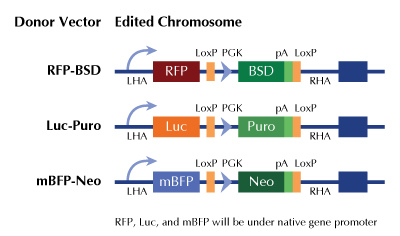Phospholipase A2 (PLA2G4A) Human Gene Knockout Kit (CRISPR)
CAT#: KN220972BN
PLA2G4A - human gene knockout kit via CRISPR, HDR mediated
Functional Cassette: GFP-puro Luciferase-Puro RFP-BSD
HDR-mediated knockout kit validation
USD 1,657.00
4 Weeks*
Specifications
| Product Data | |
| Format | 2 gRNA vectors, 1 mBFP-Neo donor, 1 scramble control |
| Donor DNA | mBFP-Neo |
| Symbol | Phospholipase A2 |
| Locus ID | 5321 |
| Components |
KN220972G1, Phospholipase A2 gRNA vector 1 in pCas-Guide CRISPR vector KN220972G2, Phospholipase A2 gRNA vector 2 in pCas-Guide CRISPR vector KN220972BND, donor DNA containing left and right homologous arms and mBFP-Neo functional cassette. GE100003, scramble sequence in pCas-Guide vector |
| Disclaimer | These products are manufactured and supplied by OriGene under license from ERS. The kit is designed based on the best knowledge of CRISPR technology. The system has been functionally validated for knocking-in the cassette downstream the native promoter. The efficiency of the knock-out varies due to the nature of the biology and the complexity of the experimental process. |
| Reference Data | |
| RefSeq | NM_001311193, NM_024420 |
| UniProt ID | P47712 |
| Synonyms | cPLA2; cPLA2-alpha; PLA2G4 |
| Summary | This gene encodes a member of the cytosolic phospholipase A2 group IV family. The enzyme catalyzes the hydrolysis of membrane phospholipids to release arachidonic acid which is subsequently metabolized into eicosanoids. Eicosanoids, including prostaglandins and leukotrienes, are lipid-based cellular hormones that regulate hemodynamics, inflammatory responses, and other intracellular pathways. The hydrolysis reaction also produces lysophospholipids that are converted into platelet-activating factor. The enzyme is activated by increased intracellular Ca(2+) levels and phosphorylation, resulting in its translocation from the cytosol and nucleus to perinuclear membrane vesicles. Alternative splicing results in multiple transcript variants. [provided by RefSeq, Jul 2015] |
Documents
| Product Manuals |
| FAQs |
| SDS |
Resources
Other Versions
| SKU | Description | Size | Price |
|---|---|---|---|
| KN220972 | PLA2G4A - human gene knockout kit via CRISPR, HDR mediated |
USD 1,657.00 |
|
| KN220972LP | PLA2G4A - human gene knockout kit via CRISPR, HDR mediated |
USD 1,657.00 |
|
| KN220972RB | PLA2G4A - human gene knockout kit via CRISPR, HDR mediated |
USD 1,657.00 |
|
| KN420972 | PLA2G4A - KN2.0, Human gene knockout kit via CRISPR, non-homology mediated. |
USD 1,657.00 |
|
| GA103582 | PLA2G4A CRISPRa kit - CRISPR gene activation of human phospholipase A2 group IVA |
USD 1,657.00 |
{0} Product Review(s)
Be the first one to submit a review






























































































































































































































































 Germany
Germany
 Japan
Japan
 United Kingdom
United Kingdom
 China
China
